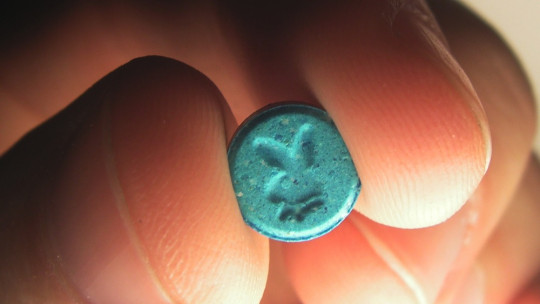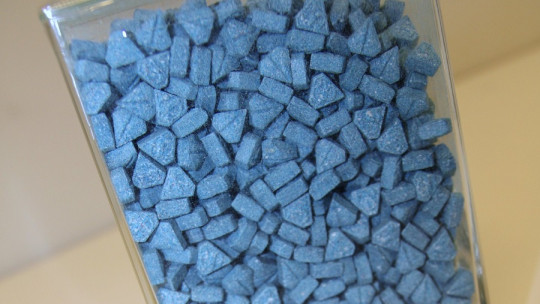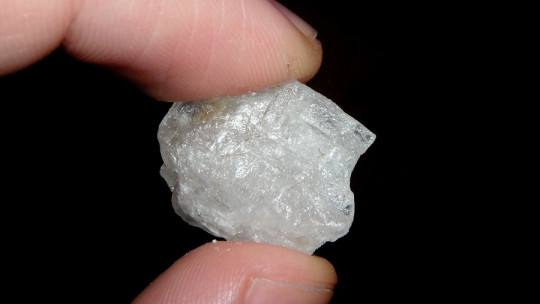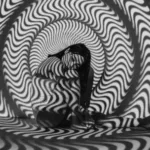Concerts, discos, parties… In all these situations, most people move for hours, expending large amounts of energy until, in some cases, reaching exhaustion. However, some people use different drugs and substances in order to endure energy expenditure for hours and at the same time provoke feelings of euphoria and companionship.
One of the substances most used in this sense is ecstasy or MDMA. However, this hallucinogenic substance is not harmless, but rather alters our body to a great extent and sometimes in a way that is dangerous to our health and life itself. In this article we present some of the effects of ecstasy both short and long term
Ecstasy or MDMA
Ecstasy or MDMA is a psychodysleptic psychoactive substance (or disturbing), a type of substance that generates changes in the activity of the brain and causes perceptual and mood alterations. Due to its chemical composition, it is part, along with mescaline and other drugs, of the phenylalkylamines group.
This substance (3,4-methylenedioxymethamphetamine) generates an expansive and euphoric mood , increased self-confidence and ego, hyperarousal, hallucinations, alteration in time perception and feelings of peace and trust with others. The heart and breathing speed up, and the feeling of hunger, thirst and physical fatigue is reduced. However, at the same time it generates a state of tranquility and relaxation.
Ecstasy is one of the most widespread types of hallucinogen , being, along with marijuana and cocaine, one of the most consumed illegal drugs. This consumption is generally carried out recreationally, although on occasions they have been used in various investigations and therapeutic use was even explored in the 1960s.
However, today ecstasy is not considered an element with proven therapeutic properties, so it is only used as a recreational drug especially at parties and discos
Mechanism of action
The main mechanism of action of this substance is based on the acceleration and increase in monoamine synthesis affecting dopamine and serotonin.
This increase in the synthesis and transmission of these neurotransmitters explains the activating effects of ecstasy, as well as the feeling of peace, tranquility, empathy and social approach
Furthermore, it is observed that the continued use of this substance causes a degradation of serotonergic neurons which explains the presence of different side effects in chronic users and poisoning.
Short-term effects of MDMA
The immediate effects of ecstasy They are widely known and some have been mentioned previously. MDMA generates an increase in nervous activity, causing excitement and euphoria. It also generates feeling of closeness and trust both with oneself and with others, tranquility and calm.
Furthermore, another effect of ecstasy is that alters the perception of tiredness, hunger and thirst which decrease to the point of noticing their presence.
Ecstasy causes an increase in heart rate and blood pressure, which leads to an increase in the level of energy we can expend and an increase in activity. However, this increase can generate severe injuries and hemorrhages to muscles, kidneys, and viscera, as well as cause heart damage in case of overdose This factor is one of the most dangerous when consuming MDMA.
Another of the short-term effects of ecstasy is the increase in body temperature, which is also aggravated due to the increase in physical energy caused by the substance and the use that is usually given to it (normally at parties and concerts in the city). who jumps and dances, things that raise the temperature even more). This hyperthermia can generate fever, seizures and even death, being one of the most frequent causes of death due to this drug.
On the other hand, it can also induce visual hallucinations, confusion and intense fear of those around them with paranoid characteristics, especially in what is called “bad trip”
Finally, other typical short-term symptoms are bruxism and increased tension in the jaw, as well as hyperreflexia and muscle tension. Also amnesia and loss of consciousness may occur in extreme cases reaching coma.
Long-term effects of ecstasy
Beyond the effects that the consumption of ecstasy produces immediately, it is necessary to take into account that if the consumption of this substance is prolonged over time can cause serious alterations in the body
It has been observed through various studies that prolonged consumption produces changes and deterioration in serotonergic neurons, specifically causing damage to their axons, damage that can become permanent These modifications can generate depressive and anxious symptoms.
MDMA use has also been linked to loss of mental faculties such as memory and decision-making capacity, as well as sleep disturbances. It has also been shown that frequent consumption of this substance can cause chronic psychosis, as well as intermittent hallucinations, increased impulsivity and aggressiveness, and anxious symptoms.
The use of ecstasy also causes damage to the blood-brain barrier and can generate inflammation of the brain tissue. It can also cause and/or facilitate the occurrence of strokes or serious and even fatal brain hemorrhages. Other organs that are damaged by the action of ecstasy are the liver and the heart.









